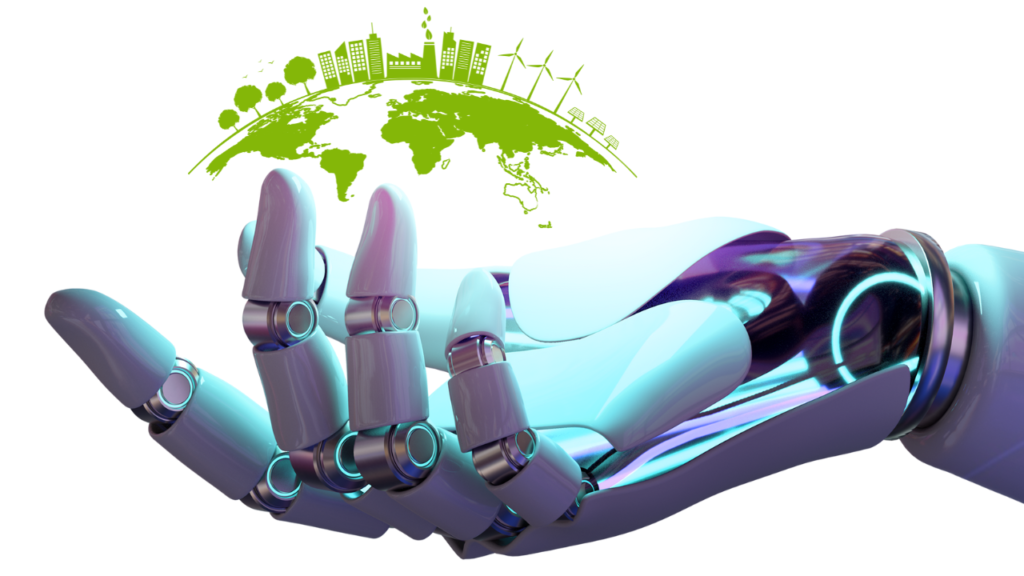Table of Contents
Introduction
Sustainable AI has emerged as a transformative force in recent years, particularly in healthcare. While artificial intelligence (AI) offers numerous benefits, including enhanced diagnostics, personalized treatment plans, and efficient operational processes, its implementation must also focus on sustainability. As the world grapples with pressing environmental challenges, integrating sustainable practices into AI applications in healthcare is not just a choice but a necessity. This blog explores how healthcare can implement AI for good health and sustainability, highlighting five key strategies that can pave the way for a greener and healthier future.

1. How AI Can Be Implemented in Healthcare
The healthcare industry is increasingly adopting AI technologies to improve patient outcomes and streamline operations. Here are some key areas where AI can be implemented:
A. Predictive Analytics
AI can analyze vast datasets to identify patterns and predict patient outcomes. Predictive analytics helps healthcare providers anticipate disease outbreaks, manage patient loads, and allocate resources efficiently. For example, hospitals can use AI algorithms to predict patient admissions, allowing them to optimize staffing and bed availability.
B. Telemedicine and Remote Monitoring
AI-powered telemedicine solutions enable healthcare providers to offer virtual consultations, reducing the need for in-person visits. Remote monitoring devices equipped with AI can track patients’ vital signs and health data in real time, alerting healthcare professionals to any abnormalities. This approach not only enhances patient care but also reduces the carbon footprint associated with transportation.
C. Personalized Medicine
AI can analyze genetic information and patient history to create personalized treatment plans. By tailoring treatments to individual patients, healthcare providers can improve outcomes and minimize unnecessary interventions, ultimately leading to more efficient resource use.
D. Administrative Automation
AI can streamline administrative tasks such as scheduling, billing, and documentation. By automating these processes, healthcare organizations can reduce operational costs and improve efficiency, allowing staff to focus more on patient care rather than administrative burdens.
E. Clinical Decision Support Systems (CDSS)
AI-driven CDSS can assist healthcare providers in making informed decisions by analyzing clinical data and providing evidence-based recommendations. These systems help clinicians reduce errors and improve patient safety while ensuring adherence to best practices.
Case Study: IBM Watson Health
IBM Watson Health exemplifies the effective implementation of AI in healthcare. Watson analyzes large volumes of medical literature and patient data to provide oncologists with treatment recommendations tailored to individual cancer patients. This personalized approach has led to better treatment outcomes and enhanced patient satisfaction.

2. How Can AI Be Used to Achieve Good Health?
AI’s potential extends beyond operational efficiency; it can significantly contribute to achieving better health outcomes. Here are some ways AI can be harnessed to promote good health:
A. Early Disease Detection
AI algorithms can analyze medical imaging and laboratory results to identify diseases at their earliest stages. Early detection is critical for conditions like cancer, where timely intervention can save lives. For instance, AI has been successfully employed in radiology to detect tumors in mammograms and chest X-rays more accurately than human radiologists.
B. Chronic Disease Management
AI can play a crucial role in managing chronic diseases such as diabetes and hypertension. AI-powered applications can monitor patients’ health metrics, provide personalized recommendations, and alert healthcare providers when intervention is needed. This proactive approach helps patients maintain better health and reduces hospitalizations.
C. Mental Health Support
AI-driven chatbots and mental health applications can provide immediate support to individuals facing mental health challenges. These tools offer therapy sessions, coping strategies, and resources, making mental health care more accessible and reducing the stigma surrounding it.
D. Population Health Management
AI can analyze population health data to identify trends and risk factors. By understanding the health needs of specific populations, healthcare providers can design targeted interventions and preventive measures, ultimately leading to healthier communities.
E. Drug Discovery and Development
AI accelerates the drug discovery process by analyzing biological data and predicting how different compounds will interact with specific diseases. This capability can shorten the time it takes to bring new drugs to market and reduce the costs associated with drug development.
Case Study: Zebra Medical Vision
Zebra Medical Vision uses AI to analyze medical imaging and detect diseases early. Their algorithms have demonstrated high accuracy in identifying conditions such as cardiovascular diseases and various cancers, significantly contributing to early diagnosis and better health outcomes.

3. How Can AI Be Used for Sustainability?
AI has the potential to drive sustainability initiatives in healthcare, addressing both environmental concerns and resource management. Here are some strategies:
A. Energy Efficiency in Healthcare Facilities
AI can optimize energy usage in healthcare facilities by analyzing consumption patterns and suggesting energy-saving measures. Smart building systems equipped with AI can automatically adjust lighting, heating, and cooling based on occupancy and weather conditions, significantly reducing energy waste.
B. Waste Reduction
AI can help minimize waste in healthcare by optimizing supply chain management and predicting inventory needs. For instance, AI algorithms can analyze historical data to forecast the demand for medical supplies, ensuring that healthcare facilities maintain adequate stock levels without overordering.
C. Telehealth and Reduced Carbon Footprint
The rise of telehealth solutions powered by AI reduces the need for patients to travel to healthcare facilities, lowering carbon emissions associated with transportation. Virtual consultations not only enhance access to care but also contribute to a more sustainable healthcare model.
D. Sustainable Drug Manufacturing
AI can optimize the drug manufacturing process by reducing material waste and improving production efficiency. By analyzing data from manufacturing processes, AI can identify opportunities for waste reduction and suggest adjustments that lead to more sustainable practices.
E. AI for Environmental Health
AI can analyze environmental data to assess the impact of pollution and other environmental factors on public health. By identifying areas at risk due to environmental issues, healthcare providers can implement preventive measures to safeguard community health.
Case Study: Siemens Healthineers
Siemens Healthineers employs AI to optimize the energy consumption of medical imaging devices. Their solutions analyze usage patterns to ensure that equipment operates efficiently, reducing energy costs and minimizing the environmental impact of healthcare services.

Conclusion
Sustainable AI in healthcare is not just about harnessing the latest technologies; it’s about integrating those technologies into a framework that prioritizes patient care, operational efficiency, and environmental responsibility. By implementing AI strategically, the healthcare sector can achieve better health outcomes while contributing to a more sustainable future.
As healthcare continues to evolve, embracing sustainable AI practices will be crucial for organizations aiming to lead the way in innovation, efficiency, and responsible resource management. The five strategies outlined in this blog serve as a roadmap for healthcare providers to leverage AI effectively and sustainably, ultimately benefiting both patients and the planet.
What is Sustainable AI?
Sustainable AI refers to the development and implementation of artificial intelligence systems that prioritize environmental and social responsibility. In healthcare, this means leveraging AI technologies in ways that enhance patient care while minimizing ecological impact.
What role does data play in Sustainable AI?
Data is crucial for Sustainable AI as it drives AI algorithms. High-quality, diverse, and ethically sourced data ensures accurate AI predictions and recommendations, ultimately enhancing patient outcomes while adhering to sustainability principles.
What is the future of Sustainable AI in healthcare?
The future of Sustainable AI in healthcare looks promising, with advancements in technology leading to more efficient and effective solutions. Continued focus on sustainability will drive innovations that prioritize patient well-being, environmental responsibility, and operational efficiency.